Dear Zazie, Here is today’s Lovers’ Chronicle from Mac Tag dedicated to his muse. Follow us on twitter @cowboycoleridge. Rhett
The Lovers’ Chronicle
Dear Muse,
-i’m gonna try to put myself
back in that place again-
always starts with
london homesick blues
“I know that song”
sure have taken
some fancy ones
“I’m glad you did
because they led you here”
absolutely, the good,
the bad and the ugly
“The necessary”
well put, now
what are my chances
© copyright 2023 mac tag/cowboycoleridge all rights reserved
© copyright 2021 mac tag/cowboy coleridge all rights reserved
oh, here comes that dream
© copyright 2020 mac tag/cowboy coleridge all rights reserved
passeth away
frail, our words
shall play the parts
what will be
hath not limits
where we are
must we ever be
turnin’ an eye to the past
inconsolable otherwise
i keep lookin’
at that moment
Hugo said,
aimer c’est agir
shall we
© copyright 2019 mac tag/cowboy coleridge all rights reserved
“C’est ici le combat
du jour et de la nuit…
Je vois de la lumière noire”
this is the battle
between day and night…
i see black light
what makes night
within us
may leave stars…
come make night
with me
jouir en bien
literally,
enjoy in good
idiomatically…
well, come with me
and together
we will find out
after all,
time gits away
© copyright 2018 mac tag/cowboy coleridge all rights reserved
time, too much perhaps,
spent turnin’ an eye
towards the past
the broken trail behind
the chances taken
and not taken
not so much
a review of regret
have those stacked
up like cord wood,
dealt and done with
but, there is one
chance not taken,
one regret, one moment
i keep lookin back on
i will see that moment
clearly, for whatever
is left of my days,
you walkin’ away
on that stormy evenin’
© copyright 2017 mac tag/cowboy Coleridge all rights reserved
a struggle
for damn sure
between light and dark
i see black
time gits away
and life is frail
© copyright 2017 mac tag/cowboy Coleridge all rights reserved
| Christopher Marlowe | |
|---|---|

An anonymous portrait in Corpus Christi College, Cambridge, believed to show Christopher Marlowe.
|
|
Today is the baptismal day of Christopher Marlowe, also known as Kit Marlowe (Canterbury, Kent; baptised 26 February 1564 – 30 May 1593 Deptford, Kent); playwright, poet and translator of the Elizabethan era. Marlowe was the foremost Elizabethan tragedian of his day. He greatly influenced William Shakespeare, who was born in the same year as Marlowe and who rose to become the pre-eminent Elizabethan playwright after Marlowe’s mysterious early death. Marlowe’s plays are known for the use of blank verse and their overreaching protagonists.
A warrant was issued for Marlowe’s arrest on 18 May 1593. No reason was given for it, though it was thought to be connected to allegations of blasphemy—a manuscript believed to have been written by Marlowe was said to contain “vile heretical conceipts”. On 20 May, he was brought to the court to attend upon the Privy Council for questioning. There is no record of their having met that day, however, and he was commanded to attend upon them each day thereafter until “licensed to the contrary”. Ten days later, he was stabbed to death by Ingram Frizer. Whether the stabbing was connected to his arrest has never been resolved.
Verse
Come live with me and be my Love,
And we will all the pleasures prove
That hills and valleys, dales and fields,
Or woods or steepy mountain yields.
And we will sit upon the rocks,
And see the shepherds feed their flocks
By shallow rivers, to whose falls
Melodious birds sing madrigals.
And I will make thee beds of roses
And a thousand fragrant posies.
- The Passionate Shepherd to His Love (unknown date), stanzas 1 and 2
Tamburlaine (c. 1588)
- Time passeth swift away;
Our life is frail, and we may die to-day.- Mycetes, Act I, scene i, line 68
- Our swords shall play the orators for us.
- Techelles, Act I, scene ii, line 132
- Accurst be he that first invented war.
- Mycetes, Part 1, Act II, scene iv, line 1
- Let Earth and Heaven his timeless death deplore,
For both their worths shall equal him no more.- Amyras, Part 2, Act V, scene iii, lines 252–253
Doctor Faustus (c. 1593)
- Che serà, serà:
What will be, shall be.- Faustus, Act I, scene i, lines 47–58
- Hell hath no limits, nor is circumscrib’d
In one self place; but where we are is hell,
And where hell is, there must we ever be.- Mephistopheles, Act II, scene i, line 118
- When all the world dissolves,
And every creature shall be purified,
All places shall be hell that are not heaven.- Mephistopheles, Act II, scene i, line 120. In the first line, Marlowe references Isaiah in Isaiah 24:19 and 34:4; in the second line, he references Daniel in Daniel 12:10.
- Was this the face that launch’d a thousand ships,
And burnt the topless towers of Ilium?
Sweet Helen, make me immortal with a kiss!- Faustus, Act V, scene i, lines 91–93
- Pray for me! and what noise soever ye hear, come not unto me, for nothing can rescue me.
- Faustus, Act V, scene ii, lines 57–58
- He that loves pleasure, must for pleasure fall.
- Evil Angel, Act V, scene iv
Hero and Leander (published 1598)
- A pleasant-smiling cheek, a speaking eye,
A brow for love to banquet royally.- First Sestiad
- It lies not in our power to love or hate,
For will in us is overruled by fate.- First Sestiad
- Who ever loved that loved not at first sight?
- First Sestiad. The same statement occurs in As You Like It (1600) by William Shakespeare, and a similar one in The Blind Beggar of Alexandria (1596) by George Chapman.
- Like untuned golden strings all women are,
Which long time lie untouch’d, will harshly jar.
Vessels of brass, oft handled, brightly shine.- First Sestiad
- All women are ambitious naturally.
- First Sestiad
- Love always makes those eloquent that have it.
- Second Sestiad
- Above our life we love a steadfast friend.
- Second Sestiad
| Victor Hugo | |
|---|---|
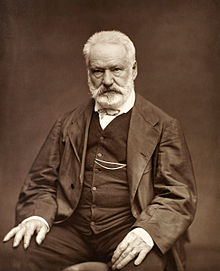
Woodburytype of Hugo by Étienne Carjat, 1876
|
Today is the birthday of Victor Marie Hugo (Besançon, Doubs; 26 February 1802 – 22 May 1885 Paris); poet, novelist, and dramatist of the Romantic movement. In my opinion, one of the greatest and best-known French writers. Outside France, his best-known works are the novels Les Misérables, 1862, and The Hunchback of Notre-Dame (French: Notre-Dame de Paris), 1831. In France, Hugo is known primarily for his poetry collections, such as Les Contemplations (The Contemplations) and La Légende des siècles (The Legend of the Ages). He produced more than 4,000 drawings and also campaigned for social causes such as the abolition of capital punishment.
Though a committed royalist when he was young, Hugo’s views changed as the decades passed, and he became a passionate supporter of republicanism; his work touches upon most of the political and social issues and the artistic trends of his time. He is buried in the Panthéon in Paris. His legacy has been honoured in many ways, including his portrait being placed on French currency.
Verse
Hélas ! vers le passé tournant un œil d’envie,
Sans que rien ici-bas puisse m’en consoler,
Je regarde toujours ce moment de ma vie
Où je l’ai vue ouvrir son aile et s’envoler!
Je verrai cet instant jusqu’à ce que je meure,
L’instant, pleurs superflus !
Où je criai : L’enfant que j’avais tout à l’heure,
Quoi donc ! je ne l’ai plus !
Alas! turning an envious eye towards the past,
inconsolable by anything on earth,
I keep looking at that moment of my life
when I saw her open her wings and fly away!
I will see that instant until I die,
that instant—too much for tears!
when I cried out: “The child that I had just now—
what! I don’t have her any more!”
C’est ici le combat du jour et de la nuit… Je vois de la lumière noire.
- This is the battle between day and night… I see black light.
Aimer, c’est agir
- To love is to act
- Last words of his diary, written two weeks before his death, published in Victor Hugo : Complete Writings (1970)
- La musique…est la vapeur de l’art. Elle est à la poésie ce que la rêverie est à la pensée, ce que le fluide est au liquide, ce que l’océan des nuées est à l’océan des ondes.
- Music…is the vapour of art. It is to poetry what revery is to thought, what the fluid is to the liquid, what the ocean of clouds is to the ocean of waves.
- Part I, Book II, Chapter IV
- Music…is the vapour of art. It is to poetry what revery is to thought, what the fluid is to the liquid, what the ocean of clouds is to the ocean of waves.
- Ce qu’on ne peut dire et ce qu’on ne peut taire, la musique l’exprime.
- Music expresses that which cannot be said and on which it is impossible to be silent.
- Part I, Book II, Chapter IV
- Music expresses that which cannot be said and on which it is impossible to be silent.



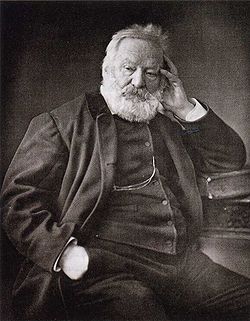



His faithful mistress, Juliette Drouet, died in 1883, only two years before his own death.
Two days before dying, he left a note with these last words: “Aimer, c’est agir” (To love is to act). Hugo’s death from pneumonia at the age of 83, generated intense national mourning. He was not only revered as a towering figure in literature, he was a statesman who shaped the Third Republic and democracy in France. More than two million people joined his funeral procession in Paris from the Arc de Triomphe to the Panthéon, where he was buried. He shares a crypt within the Panthéon with Alexandre Dumas and Émile Zola.
Hugo left five sentences as his last will, to be officially published:
Je donne cinquante mille francs aux pauvres. Je veux être enterré dans leur corbillard.
Je refuse l’oraison de toutes les Églises. Je demande une prière à toutes les âmes.
Je crois en Dieu.
“I leave 50,000 francs to the poor. I want to be buried in their hearse.
I refuse [funeral] orations of all churches. I beg a prayer to all souls.
I believe in God.”
C’est ici le combat du jour et de la nuit… Je vois de la lumière noire.
- This is the battle between day and night… I see black light.
- Last words
Gallery
-

Crépuscule (“Twilight”), Jersey, 1853–1855.
-

Ville avec le pont de Tumbledown, (“Town with Tumbledown Bridge”),1847.
-

Pieuvre avec les initiales V.H., (“Octopus with the initials V.H.”), 1866.
-

Le phare (“The Lighthouse”)
-

Gavroche a onze ans, (“Gavroche is eleven years old”).
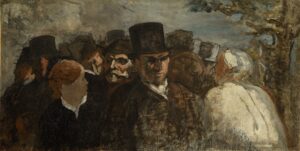
Passants, vers 1858-1860, musée des Beaux-Arts de Lyon.
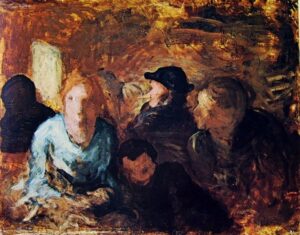
Figure sedute
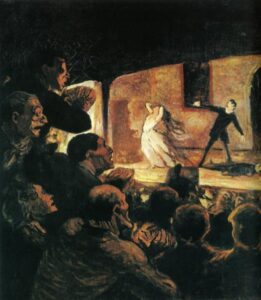
théâtre

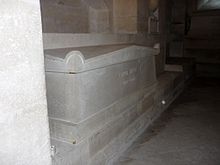
No Comments on "The Lovers’ Chronicle 26 February – chances – verse by Christopher Marlowe – art by Honoré Daumier & Annie Swynnerton – verse and art by Victor Hugo"